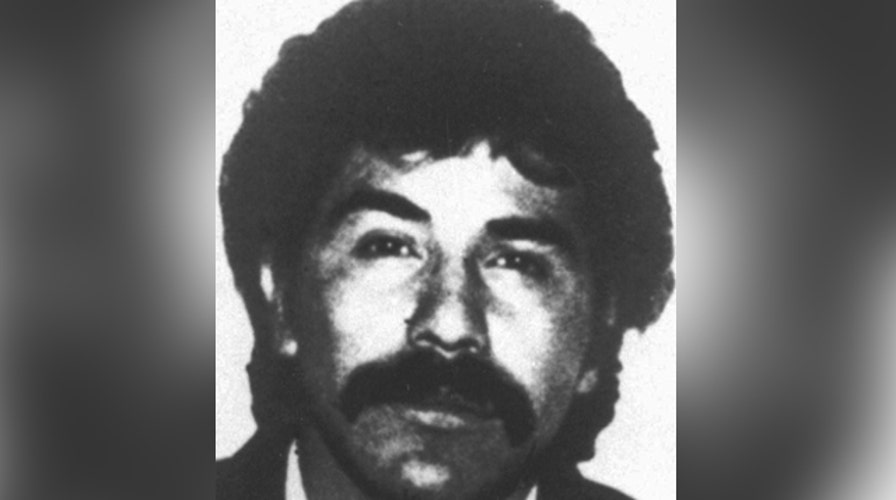Mexican drug lord released from jail due to ‘improper trial’
Alisyn Camerota reports from New York
The Obama administration responded Sunday to the prison release of a Mexican drug lord who was serving 40 years for the 1985 kidnapping, torture and murder of U.S. Drug Enforcement Administration agent Enrique “Kiki” Camarena.
“We are deeply concerned by the release of Rafael Caro Quintero from prison in Mexico,” said National Security Council spokeswoman Caitlin Hayden. “We remain as committed today in seeing Quintero and others involved in this crime face justice in the United States as we were in the immediate aftermath of Kiki Camarena's murder and will work closely with the Mexican authorities on this.”
The statement follows a lawyer for Mexican drug traffickers Ernesto Fonseca Carrillo, also imprisoned in the Camarena case, saying his legal team had filed an appeal based on the same procedural grounds used by Caro Quintero and that he expects his client to be freed within 15 days by a different court.
Caro Quintero was released Friday by a Mexican court that overturned the conviction, saying he had been improperly tried in a federal court for state crimes.
The Justice Department said it found the court's decision "deeply troubling."
"The Department of Justice, and especially the Drug Enforcement Administration, is extremely disappointed with this result," the agency said in a statement.
The Justice Department also said it "has continued to make clear to Mexican authorities the continued interest of the United States in securing Caro Quintero's extradition so that he might face justice in the United States."
The DEA said separately it "will vigorously continue its efforts to ensure Caro Quintero faces charges in the United States for the crimes he committed."
Caro Quintero still faces charges in the United States.
The Mexican government said Friday it was reviewing what legal moves it might take in the case, according to The Wall Street Journal.
The country’s attorney general's office said in a statement it disagrees with the immediate liberation and the court should have handed over the case to the proper court for review. The office also said Caro Quintero’s charges were too serious to free him without exhausting all legal channels.
In recent years, Mexico has stepped up extraditions of alleged drug kingpins to the U.S., usually after they have served some prison time in Mexico, according to The Journal.
The whereabouts of the 61-year-old Quintero is unclear, after serving 20 years and walking out of prison.
The Association of Former Federal Narcotics Agents in the United States said it was "outraged" by Caro Quintero's early release and blamed corruption within Mexico's justice system.
"The release of this violent butcher is but another example of how good faith efforts by the U.S. to work with the Mexican government can be frustrated by those powerful dark forces that work in the shadows of the Mexican 'justice' system," the organization said in a statement.
Mexican authorities did not release the full decision explaining the reasoning of the three-judge panel, in the western state of Jalisco, in setting free Caro Quintero. But some experts said the ruling may have been part of a broader push to rebalance the Mexican legal system in favor of defendants' rights, from both law-enforcement officials and the independent judicial system. Mexico's Supreme Court has issued several recent rulings overturning cases while saying due process wasn't followed.
However, Mexican and current and former U.S. officials alike expressed deep skepticism that correct procedures were followed in the decision to free Caro Quintero.
Caro Quintero was a founding member of one of Mexico's earliest and biggest drug cartels. He helped establish a powerful cartel based in the northwestern Mexican state of Sinaloa that later split into some of Mexico's largest cartels, including the Sinaloa and Juarez cartels.
But he wasn't tried for drug trafficking, a federal crime in Mexico. Instead, Mexican federal prosecutors, under intense pressure from the United States, put together a case against him for Camarena's kidnapping and killing, both state crimes.
Mexican courts and prosecutors have long tolerated illicit evidence such as forced confessions and have frequently based cases on questionable testimony or hearsay. Such practices have been banned by recent judicial reforms, but past cases, including those against high-level drug traffickers, are often rife with such legal violations.
Mexico's relations with Washington were badly damaged when Caro Quintero ordered Camarena kidnapped, tortured and killed, purportedly because he was angry about a raid on a 220-acre (89-hectare) marijuana plantation in central Mexico named "Rancho Bufalo" -- Buffalo Ranch -- that was seized by Mexican authorities at Camarena's insistence.
Camarena was kidnapped in Guadalajara, a major drug trafficking center at the time. His body and that of his Mexican pilot, both showing signs of torture, were found a month later, buried in shallow graves. Caro Quintero was eventually hunted down in Costa Rica.
The Associated Press contributed to this report.





